Glorious homemade ghee, liquid gold is food from the gods. It is lactose-free so even people with a dairy intolerance are most likely able to have it, providing you’re very careful to strain off all the milk solids. It tastes better fresh too. You can also be sure you are using really good quality butter from outdoor reared, grass-fed cows.
Ghee, also known as clarified butter, is prepared by heating butter to remove water content through evaporation and filtering out the milk solids, resulting in a golden medicinal liquid. Ghee is also an excellent cooking medium. Unlike other oils such as olive, canola and Sesame, which when heated at high temperatures create peroxides and other dangerous free radicals, Ghee has a very high smoke point and remains stable during cooking. This is due to Ghee’s stable saturated bonds, which enable it to hold its natural form during cooking. This makes Ghee excelling for sautéing, stir-frying and baking – it’s generally the best oil to cook with. It also lends a very rich and soothing flavour to dishes, which works well with both sweet and savory foods.
Ghee, a staple of Indian cooking and Ayurvedic medicine, is pure butterfat. The golden liquid is made by heating butter and allowing the proteins, milk solids (sugars) and water to separate from the fat. Ghee isn’t only full of flavour it’s full of vitamins! Fat-soluble vitamins A, E, D and K2 to be exact.
Ghee is also a source of vitamin K2, a much talked about vitamin available only from animal sources. K2 is being touted for its role in supporting bone and heart health. It is used to deposit calcium in appropriate locations (such as bones and teeth) and preventing problematic deposition of calcium in areas like the arteries and soft tissues. [1] K2 is also important for brain health, the utilization of minerals and reproductive health. It is an important pre-conception and pregnancy nutrient for healthy facial and dental development in newborns.[2]
You can find Ghee in most supermarkets and health food stores in the butter section, but some commercial Ghee’s are adulterated with un-pure oils, so making your own Ghee is best for health, taste and value. Always use unsalted and organic butter.
Ayurveda and Glorious Ghee
Ayurvedic wisdom believes that ghee is an important part of a healthy diet. Food is medicine. You only need one or two teaspoons of ghee per day in food to provide nourishment and healing to the body itself, and increase the capacity of the body be nourished by other foods. Ayurveda has traditionally considered ghee to be the healthiest source of edible fat, and it is highly praised and revered for its healing properties. Ghee promotes longevity and protects the body from various diseases and is famed for supporting self-awareness and intelligence. People with milk intolerance can generally consume ghee as the milk solids that contain the allergenic proteins have been removed.
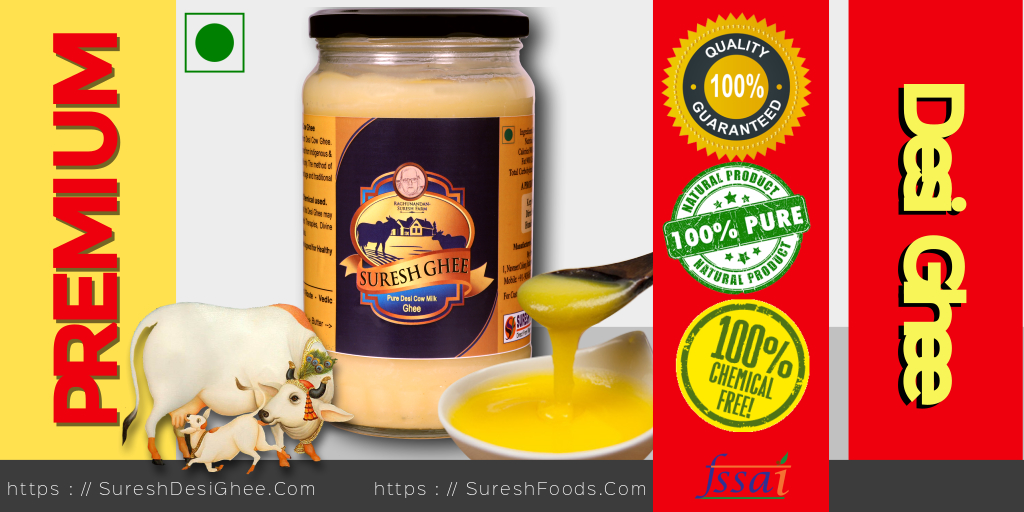
Read our blog – Why The Pure Desi Cow Milk Ghee Is Costlier Than Normal Ghee?

Health Benefits of Glorious ghee
- Ghee acts as a fuel for our digestive fire (Agni) by aiding the secretion of stomach acids and improving absorption and assimilation of nutrients. Being a fat and high in antioxidants, it promotes cellular health by enhancing nutrient absorption into the cells – especially the fat-soluble vitamins A and D.
- Ghee softens and lubricates all our internal organs, body tissues and connective tissues, thereby rendering the body more flexible – excellent for Yogis, athletes and the aging alike. This lubricating effect on the body also aids in combating dry skin and hair, and brittle nails.
- Ghee strengthens the energy system of the body, and promotes our inner vitality and glow. Modern science tells us that ghee contains phenolic antioxidants that boost the immune system, and is high in butyric acid – a fatty acid that contains anti-viral properties and is believed to inhibit the growth of cancerous tumours.
- Ghee improves memory, intellect and clarity of thought. About two-thirds of our brain is composed of all sorts of fats – all the membranes that cover the neurons are composed of fatty acid molecules and even the Myelin sheath (the protective cover of the nervous system) is 70% fat. The type of dietary fats found in Ghee has a special affinity for these tissues, and provides nourishment and strength to the brain and nervous system.
- Ghee for Diabetes : Ghee consists of a low glycemic index. Therefore, it doesn’t increase insulin as much as compared to high glycemic index foods like White bread, white rice, etc. Consuming a moderate amount of ghee in food is recommended for people suffering from diabetes, as it drops down the release of glucose in the blood. Ghee consumption is considered good for a diabetic person if taken in medium quantities. But still in such cases people having diabetes should be careful of eating both as they’re saturated fats.
- Ghee for dryness : Ghee can help you get a supple and tender skin since ghee contains vitamin A and is rich in fatty acids, it acts as a natural brightener and moisturizer that aids in providing complete lasting hydration. Application of ghee which is rich in omega and fatty acids and antioxidants, which helps in neutralizing free radicals and nourishes the skin from deep within. Ghee has such moisturization properties that it gives a shiny effect to the skin. Ghee completely transforms dry and dull skin to healthy skin with its curing benefits.
- Ghee for warmth : One of the common properties of ghee is that it generates a lot of heat in the body which keeps the body warm from within. Therefore, it is one of the prompt ingredients in multiple dishes prepared during the winter season. Research has proven that desi ghee nutrition consists of healthy fats and fatty acids to keep warm oneself up throughout the winter season. After consumption of ghee, your body naturally warms up and with just pouring a teaspoon of boiled steamed rice, roti, dosas and so on you can look forward to your winter diet.
- Ghee for enema : In order to reduce Vata dosha and detoxify the body, administration of ghee in such a form of enema, i.e at first instance abdomen and back is massaged. The ghee gets absorbed to some extent in the body which pacifies the Vata dosha. The properties of medicated ghee aids in removing the toxins easily from the body. It supports to lubricate the large intestine, regulate bowel movement and evacuate the stools comfortably. In a systemized way it supports to decrease Vata dosha and detoxify the body.
- Regarding three Ayurvedic doshas (the three organising principles that govern human physiology): Ghee pacifies Vata (Wind) conditions such as anxiety or constipation and is acceptable for Kapha (Earth) constitutions (mucous) in moderation. It is wonderful for decreasing Pitta (Fire) conditions including ailments of inflammation, acidity and heat, both internally and externally.
Now you’re probably thinking ‘but Ghee is a saturated fat so wont it cause weight gain and increase my risk of cardiovascular disease?’ Well, although Ghee is a fat, it contains short-chain fatty acids, which are metabolized quite quickly so they don’t get stored in the body and do not increase cholesterol levels. Results from a laboratory study indicated that ghee-supplemented diets did not have any significant effect on the increase of serum total cholesterol and triglyceride levels.
In fact, studies have shown beneficial effects on serum lipid profiles. The benefits included dose-dependent decreases in serum total cholesterol, low-density lipoprotein (LDL), very low-density lipoprotein (VLDL), and triglycerides; decreased liver total cholesterol, triglycerides, and cholesterol esters.

Nutritional Benefits of Ghee:
- Suitable for people with casein allergies.
- Suitable for those with lactose intolerance.
- Ghee improves your body’s absorption of fat-soluble nutrients.
- Ghee is easier to digest than butter, because it contains no milk solids.
- A rich source of CLA (Conjugated linoleic acid) fatty acid, which promotes a healthy metabolism and gives you an antioxidant boost.
- Ghee is naturally rich in vitamin K2, which is hard to come by in other food sources. Vitamin K2 promotes healthy arteries and strong bones.
- The medium chain fatty acids (MCFA) in ghee help with the metabolism of other fats in your system – so it’s better than butter when you’re watching your weight.
- Ghee is high in carotenoids, and full of vitamins A and E. That means it boosts your immune system, cell regeneration and heart health. When you consume it in small amounts, ghee aid to lower bad cholesterol and protect your heart.
- Unlike most other cooking oils, ghee is full of a substance called butyric acid; a short chain fatty acid (SCFAs) that should naturally be present in a healthy digestive tract. Butyric acid strengthens the intestinal walls and boosts the metabolism (by promoting the production of killer T cells in the gut).

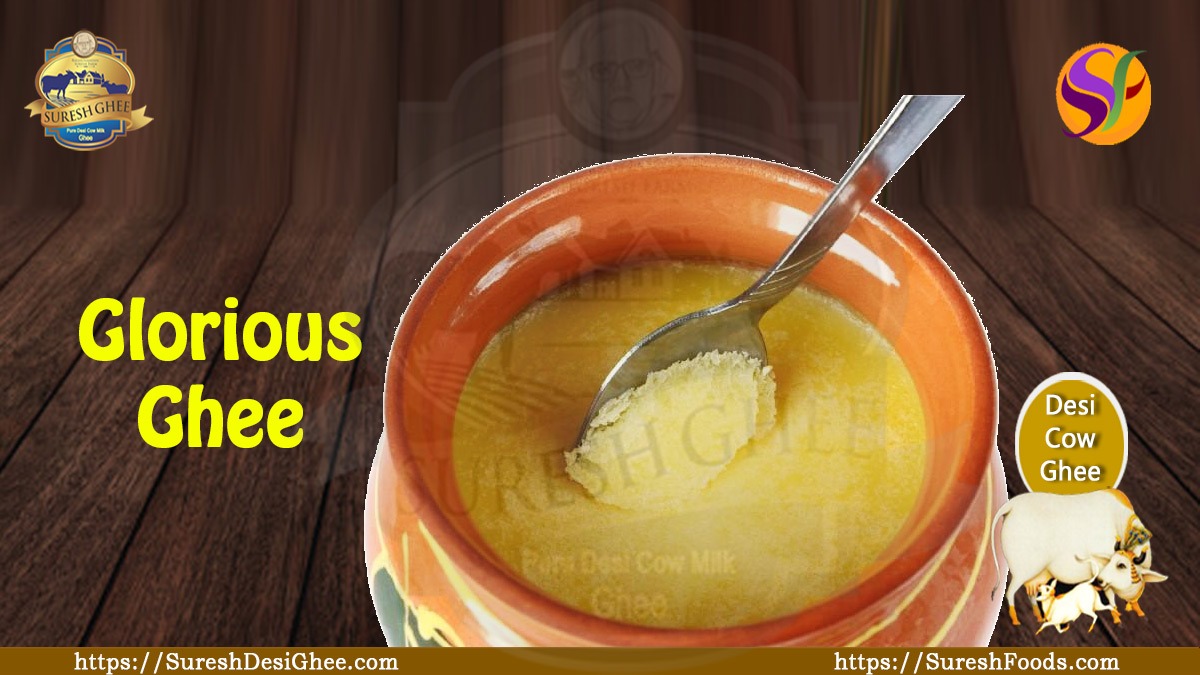
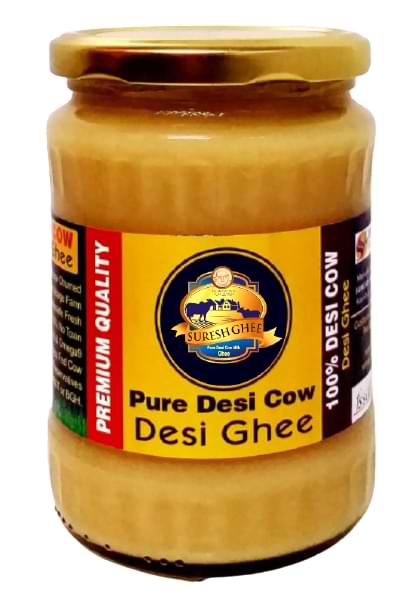
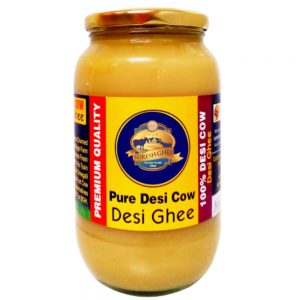
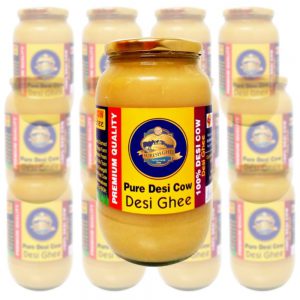
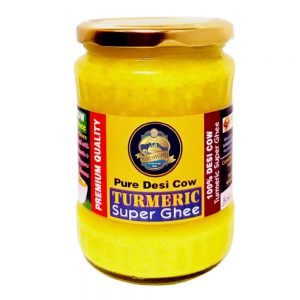
 WhatsApp us
WhatsApp us 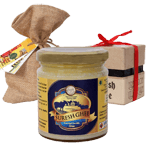
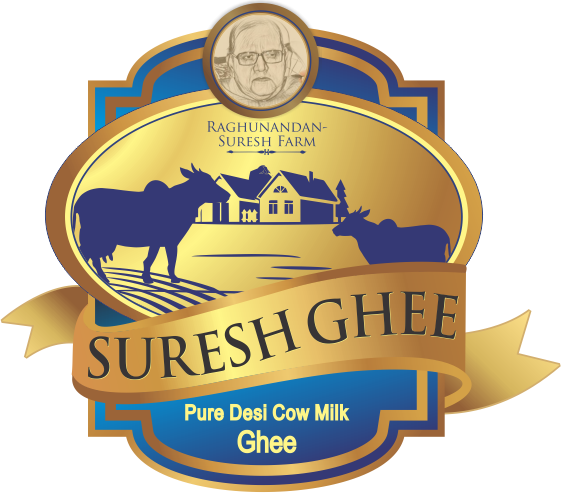
Naveen m...